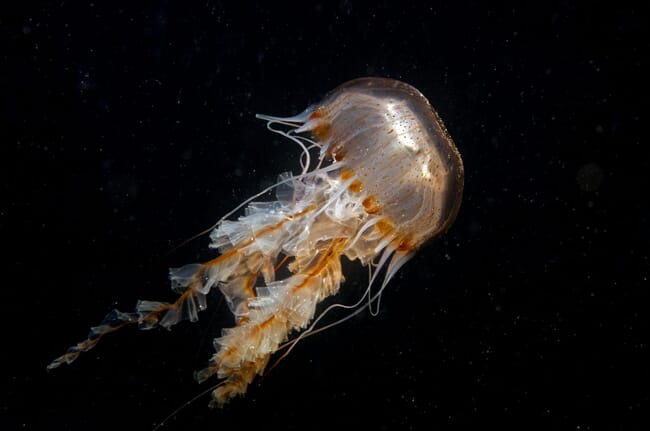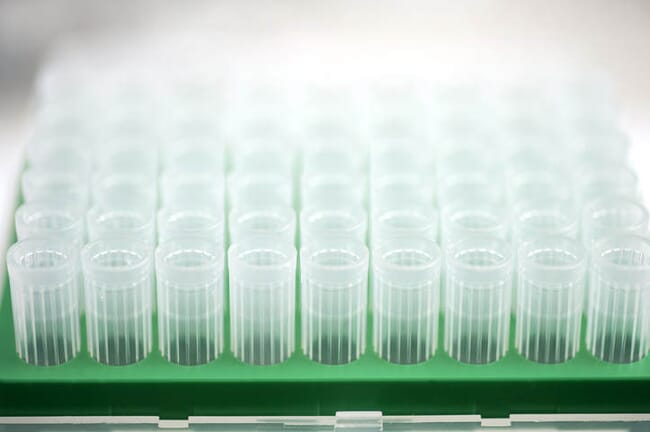A recent case study, published in the Saudi Journal of Biological Sciences, has identified jellyfish venom as a potential cancer therapy. Researchers from the University of Madras tested crude venom from the Acromitus flagellatus jellyfish against different human cancer cell lines in vitro, tracking any changes in the cells’ morphology.
Their initial results show that although cells in the control group underwent minimal changes after being exposed to the venom, cells from the human liver cancer cell line HepG2 shrank significantly within 48 hours of exposure. A similar effect was seen in cells from the human lung cancer cell line A549. The lab tests also show that the crude venom solution prevented the cancer cells from multiplying, while showing limited changes in control cells.

© Tihomir Makovec
These results indicate that molecules in the crude venom can stall and potentially reverse cancerous growths without causing severe damage to surrounding tissues. Further research could show that treatments based on A. flagellatus venom could be an effective – and innovative – lung and liver cancer therapy.
Why use jellyfish venom?
Animal venoms and toxins operate by targeting and disrupting metabolic processes in prey animals. After a jellyfish stings a fish (or unlucky human), the bioactive compounds in venom attack on a cellular level, destroying cell structures, hijacking enzyme pathways or interrupting neurotransmitters. This either weakens or kills the jellyfish’s prey outright.
As researchers began to understand how these venoms worked, they identified them as a potential source for novel drugs. The ability to target and kill cells or override biological signals are key elements in modern pharmaceuticals. If the active compounds in venom are refined, they could be harnessed as antivirals or be used to treat human health conditions like cancer.
Crude venom versus cancer cells
Researchers captured A. flagellatus specimens from a brackish water source in India. They then extracted venom from nematocyst cells in the jellyfishes’ tentacles. After conducting a biochemical and antioxidant analysis of the venom solution, the researchers created challenge tests to see the venom’s reaction to different cell lines.
The team was specifically looking at the venom’s cytotoxicity, or its ability to prevent cells from growing and multiplying. They tested different concentrations of the solution against a control (kidney cells from a green monkey), cancerous human liver cells (HepG2) and lung cancer cells (A549).
Key results
The lab results showed that while the venom had a limited effect on the green monkey cells, it slowed the growth of both the liver and lung cancer lines after 48 hours of exposure. Microscopic analysis showed that individual cells in the liver and lung cancer samples shrank after receiving a “dose” of the venom – becoming spherical after 48 hours.

The tests also indicated that A. flagellatus venom stopped the lung and liver cancer cells from proliferating without causing significant damage to the green monkey cells. The venom’s cytotoxic effect is key – preventing targeted cell growth without damaging the surrounding tissue is one of the principal theories behind cancer treatments.
From the lab to human trials
Liver and lung cancers are among the leading causes of death worldwide. Recent medical innovations have not improved the prognosis of the diseases – lung cancer has a survival rate of only about 16 percent, despite decades of research. The numbers are similarly grim for liver cancer (hepatocellular carcinoma, HCC). Any potential treatments for the diseases could dramatically improve life expectancy.
This study could be an important step in developing a new therapy for liver and lung cancer. The in vitro tests show that the bioactive compounds in A. flagellatus venom can significantly change the morphology of cancer cells and stall their growth. This ability suggests that the venom could be used to prevent or reduce cancerous growths in human trials.
If future tests can repeat these results and demonstrate jellyfish venom’s efficacy in in vivo trials, pharmacists could develop more therapy options for cancer patients.



